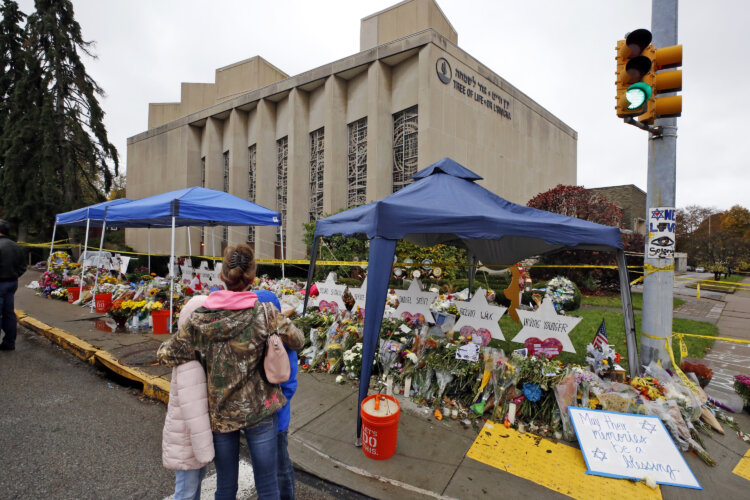
I did not want to send my children to Sunday school on that last weekend in October, the day after 11 Jews were murdered at Tree of Life synagogue in Pittsburgh. It was not for fear of violence; we know and trust the synagogue staff and local law enforcement working very hard to keep everyone safe. My concern was that my perceptive 10-year-old and eight-year-old twins would notice the increased security presence and ask questions. I love and celebrate their curiosity, and I always do my best to answer their questions honestly and directly. My kids know about the history of anti-Semitism, but I dreaded the conversation about and confrontation with anti-Semitism in all of its persistence and present-tense.
Haltingly, I sent them, grateful as ever for the teachers and clergy who share stories and rituals with an emphasis on character education and good citizenship, and on Tikkun Olam, that central and profound Jewish value of healing the world. On that afternoon I felt an urgency to tell them about what happened in Pittsburgh, to let them hear it at home in a safe space before they heard it somewhere else. There were tears and questions, mostly “why,” incipient and repeated. It is impossible to explain something that I myself can’t understand, and their stunned and sad faces reflected that same bewilderment. I implored them to come to me with any questions, and also asked that they not mention it to their friends at school, explaining that every family deserves the opportunity to navigate these discussions on their own terms. I’m not sure what I expected, but I was surprised by the brevity of the conversation and how it played out. Their reactions were similar to their reactions when our dog died last Spring, consistent with who they are as individuals and how they process grief. My eldest got quiet and melancholy, one cried out in pain, and one approached it intellectually, trying to understand why. We had no good answer, but when a classmate brought it up at recess on Monday and said that the gunman was sick, that seemed to satisfy my thinker’s inquiry. That was it.
RELATED: Mayim on Pittsburgh: I felt let down by America
I grappled with one big question myself—would my children’s Jewishness somehow become circumscribed by anti-Semitism? Was my own? I can rattle off a litany of encounters and events in my own childhood and adult life when I have observed irrational contempt for Jews. Growing up in New Orleans was complicated, and people often commented on our very Jewish names and my Israeli parents’ heavily accented English. When I was in high school a KKK Imperial Wizard ran a credible gubernatorial campaign. I know my own family’s history painfully well, and spent a year in Berlin conducting doctoral research funded by reparations money on the awkwardly named Berlin-Stipendium für Angehörige von NS-Opfern (Berlin grant for relatives of victims of the Nazi regime). The application required an essay on my family’s persecution, so if I wanted to enter the Oppression Olympics I’m pretty sure I could stick the landing.
But who wants that? The Jewish people have diverse and incredible histories, and so does our family. Persecution may be a part of those narratives but it is not the legacy. I have no interest in being defined oppositionally, where Jewishness only comes into focus against a backdrop of anti-Semitism. One of the most beautiful things I have come to understand as a parent is that children have rich spiritual lives; the opportunity to reflect and explore lets them understand themselves and the world around them. My three kids love family, traditions, community, and rituals, they take pleasure in learning, and they want to be helpful and kind. This is our Judaism. Last Friday, Jews and people of all faiths attended Sabbath services nationwide to #ShowUpForShabbat as a demonstration of solidarity with Pittsburgh. While it sounded incredible and I probably would have attended services if it was just me, it felt important to honor the traditions that we have defined within our four walls. We showed up for Shabbat the same way we do every week, in our dining room with juice for the kids and pinot noir for the grownups. Having three kids and reciting three blessings works out well. They always sort out who will light candles, pour juice, slice the challah. We catch up on the day, reflect on the week, and connect.
RELATED: Choosing anger or apathy: How to respond to tragic events
As details of the Pittsburgh gunman’s anti-immigrant, HIAS-scapegoating obsession emerged, I struggled to understand how something that is a part of our ethics could engender such murderous hatred. A few weeks prior, our family had enthusiastically gathered books, art supplies, and games to support our congregation’s refugee resettlement project, in an effort to provide a soft landing for a Rohingya Muslim family fleeing ethnic cleansing in Myanmar. My kids had some context for understanding prejudice and persecution. At Passover we tell the story of Exodus. They know that my father arrived in Tel Aviv as a young boy as fascism made its way to his Lithuanian birthplace, and that some members of my husband’s family left Poland and Belarus while the rest perished. My girls have read the American Girl Rebecca books and know about the Russian pogroms. All three know about the Holocaust, and we have taken great pains to introduce that history in sensitive and age appropriate ways. This understanding is not limited to the Jewish experience. At eight, my history-loving son insisted that we visit the Lorraine Motel, where Dr. King was assassinated, on our first big road trip that took us to Memphis. When I said that felt morbid, he explained that it was the site of the National Civil Rights Museum. On that trip, the kids saw the shards of stained glass from the 16th Street Baptist Church bombing. They learned about Jim Crow. We took them to my hometown of New Orleans. They learned about institutionalized racism and the slave trade. We do our best to keep it real. Still, for Jewish kids in suburban Chicago, these were all catastrophes from the way-back machine or far away lands, and the idea of Jews as targets seemed old-timey and remote in 21st-century America. Until last weekend. For all of our commitment to understand, we find ourselves struggling to make sense of acts and attitudes that exceed our comprehension.
The fear that gave me pause before Sunday school was the fear that anti-Semitism might somehow eclipse how my children see themselves as Jews and Americans, that it might dim the spark of their robust spiritual lives. I’m not going to lie, there were moments in the last week when I felt that shadow come over my own sense of self. But that is not what we want and it is not who we are. As a family, we are deeply committed to shining a light on the good stuff, and there is no shortage of good stuff. We don’t live in fear, we live in love. In recent days we have seen beautiful acts of compassion and healing.
I was gutted by the prospect of telling my children that we are on the receiving end of the very same kinds of intolerance, fear, violence, and hatred that they have read about in books and heard about in far-away places. What we told our kids, and what I tell myself, is that we can know and confront the ugliness in the world but still live in lovingkindness and carry peace in our hearts.


Grok Nation Comment Policy
We welcome thoughtful, grokky comments—keep your negativity and spam to yourself. Please read our Comment Policy before commenting.